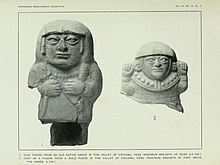Tongji (spirit medium)
| Part of a series on |
| Anthropology of religion |
|---|
 |
| Social and cultural anthropology |

Tongji (Chinese: 童乩; pinyin: tóngjī; Wade–Giles: t'ung-chi; lit. 'youth diviner') or Jitong (Chinese: 乩童; pinyin: jītóng; Wade–Giles: chi-t'ung; lit. 'divining youth') is a Daoist religious specialist, usually translated as a "spirit medium", "oracle", or "shaman".
This word compounds tong 童 "child; youth; boy servant" and ji 乩 "to divine" (cf. fuji 扶乩 "divination; planchette writing"). Regional variants include Hokkien tâng-ki 童乩 and Cantonese gei-tung 乩童 or san-daa 神打.
A tongji or jitong is a person believed to have been chosen by a particular shen 神 "god; spirit" as the earthly vehicle for divine expression. The Chinese differentiate a wu 巫 "shaman; healer; spirit medium" who gains control of forces in the spirit world versus a tongji who appears to be entirely under the control of forces in the spirit world.
Frequently a person who will become tongji experiences himself, at an early time in his or her life, to be coming under the compulsion of some god to be possessed by him. The person may well resist that compulsion. Should his resistance fail, he will from time to time enter into a trance in which he may beat himself with a nail-studded ball at the end of a cord and handle to the point that he draws blood from multiple wounds on his back. While in this trance state he will experience himself, and the members of his community of belief will experience him, as speaking the words of that god.
External links and references
- Andersen, Poul. 2008. "Tâng-ki (or jitong) 童乩 (or 乩童) spirit-medium", in The Encyclopedia of Taoism, ed. by Fabrizio Pregadio, pp. 964-966. Routledge.
- Elliott, Alan J. A. 1955. Chinese Spirit Medium Cults in Singapore. Monographs on Social Anthropology, No. 14. Department of Anthropology, London School of Economics and Political Science.
- Groot, Jan Jakob Maria. 1892-1910. The Religious System of China: Its Ancient Forms, Evolution, History and Present Aspect, Manners, Customs and Social Institutions Connected Therewith. 6 volumes. Brill Publishers.
- Jordan, David K. 1976. "A Medium's First Trance", Anthropology: Perspective on Humanity, ed. by Marc J. Swartz and David K. Jordan. John Wiley & Sons.
- Jordan, David K. 1977. "How to Become a Chinese Spirit Medium".
- Jordan, David K. 1999. Gods, Ghosts, & Ancestors: Folk Religion in a Taiwanese village. 3rd edition. Department of Anthropology, UCSD.
- Myers, John T. 1974. A Chinese Spirit-medium Temple in Kwun Tong: A Preliminary Report. Social Research Centre, Chinese University of Hong Kong.
- Myers, John T. 1975. "A Hong Kong Spirit-medium Temple", Journal of the Hong Kong Branch of the Royal Asiatic Society 15:16-27.
